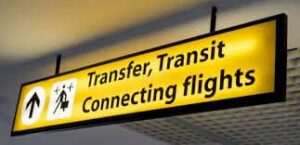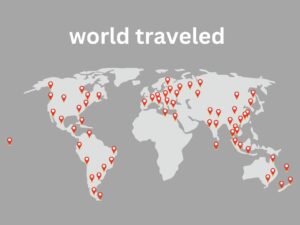The cost of the trip is already quite high and if you make a mistake it can become even higher. So the best thing is to be careful and avoid them.
Most travelers have a story that happened on their trip that they had to pay extra for.
I made a miscalculation of time to get to Rome airport and ended up missing a flight to Barcelona. My additional cost was EU 300.00 to buy another ticket.
Another time, on the way to Guarulho airport, there was an accident and access to the airport was closed for more than an hour, I ended up missing my flight.
These mistakes are often unavoidable. You cry, pay and move on.
However, you can avoid several of the most costly travel mistakes.
To do this, you just need to pay attention, plan well and always protect yourself with travel insurance.
1. Greatly reduce flight connection times.

Of course, waiting a long time for a stopover is something everyone wants to avoid.
But experience shows that flights never go as planned, and transfers can be very diverse in terms of time and complexity.
On average, more than 20% of flights are delayed and another 2% are typically cancelled.
If you miss your connecting flight, you can’t count on the airline magically making room for you on the next plane… or even the one after that.
Additionally, if bad weather has affected multiple flights, you could be stranded.
On my trip to Las Vegas, I made a connection in Toronto. My flight arrived at 6:00 am and my flight to Las Vegas was scheduled for 10:00 am.
At 8:00 am the airport closed due to bad weather.
All flights were canceled without notice. I ended up leaving at 11pm and that was luck, because a passenger was called and didn’t show up and the attendant looked at me and said, do you want the seat? Of course I went.
But it cost another US$60.00 for food and transportation
This is especially true if you are traveling to attend a special and very important event.
Something you really need to attend, like a wedding, a business meeting, etc.
You really need to leave a 24-hour reserve for any unforeseen events.
What about travel insurance? Typically your reimbursement is for missed prepaid expenses as well as eligible expenses incurred due to a covered delay. However, the delay must have been caused by a covered reason mentioned in your plan.
And of course the loss of a marriage is priceless.
2. Book everything through online travel agency portals.
Sites like Expedia, Booking.com, Kayak, Hotels.com and TripAdvisor are fantastic for helping you compare prices and check reviews and make your reservations.
However, you need to pay close attention to the reservation and payment conditions.
Also what are the conditions for change, as the response time to resolve any problems is longer.
I use booking.com a lot for hotel reservations, but I confess that when a problem occurs, the response time is not that good.
Having someone to talk to on the phone can help a lot with problem solving, but that’s not the trend.
Cases like 123milhas leave many people frustrated and many dreams postponed or lost.
Even the airlines have some problems with the Alitalia case.
My Daughter bought a ticket to come to Brazil in March 21 to embark in December and the company closed.
It took almost a year for her to get her money back.
However, these cases are rarer.
3. Excess weight in luggage.

When we travel we tend to want to buy souvenirs, new things, etc.
However, we already had so many bags that we almost had to pay for excess weight.
So how are we going to carry these extras?
We Brazilians always think there will be a way out, but each time the airlines are tightening these rules.
If they decide to charge you, you could be shelling out a hundred dollars (or more) that could have been avoided with a little more preparation. Each airline differs in weight limits and costs, but it’s important to be aware.
4. Not buying travel insurance
Worried about buying travel insurance and not needing it? In fact, this is the best possible scenario.
The worst-case scenario: You don’t buy insurance for your big international trip, and while traveling you become seriously ill or injured.
Now, you have to pay, out of your pocket:
The cost of emergency medical care. Everyone knows it can get very expensive.
Any admission to the hospital will cost tens of thousands of dollars.
The cost of an emergency medical evacuation, which can reach $200,000 (in remote and undeveloped parts of the world).
On my trip to Everest Camp, I witnessed a helicopter rescue
The cost of repatriation, which means transporting you home when you are stable enough to travel.
My friend, on his trip to India, was hospitalized for 15 days and had to be transferred with Semi-ICU to the United States.
The cost of your missed travel expenses
A solid travel insurance plan can pay or reimburse all of these costs after a covered illness or injury, up to your plan’s maximum limits.
Not having insurance could be the most expensive travel mistake you ever make.
I never travel without insurance, I always use World Nomads and the Assist card.
5. Waiting too long to buy travel insurance.
You just spent $2,000 on your plane ticket and resort stay for your next trip.
Of course you don’t want to spend more on travel insurance, and prefer to wait longer to buy it.
Time passes and the days turn into months and the trip is coming.
Then there is an accident or an illness that makes it impossible for you to travel.
To save money, you bought the non-refundable plane ticket, booked the hotel without the right to cancel, etc.
If you had insurance, you could have filed a trip cancellation request for a refund, but it’s too late now.
Scenarios like this show why it’s essential to secure your trip as soon as possible after planning your trip. The sooner you buy, the longer your coverage time will be.
6. Leave data roaming turned on
We all know about the exorbitant costs of international roaming.
However, in the euphoria of the trip you may forget this detail and only realize it when your cell phone bill arrives.
Basically we have three data options abroad.
You can leave data roaming on and pay a fortune.
Turn off data roaming and spend the entire time of your trip looking for free WiFi.
And the best option is to buy a prepaid SIM card from the country where you are going to visit.
7. Being an easy target for scams and theft

It is very frustrating to find out that you have fallen for a scam.
And when you’re traveling you’re much more vulnerable.
However, it is quite possible to avoid the vast majority and to do so you just need to have knowledge and always be aware.
Petty theft can be a worse situation that could occur while you are traveling.
No one wants to be thousands of kilometers from home and without a phone, wallet or passport, and it is important to always be on the lookout for possible pickpockets.
8. Do not negotiate the price in advance, whether in a taxi or in a store.
We Brazilians are not used to negotiating prices.
You get in the taxi and know the price at the end of the ride.
When you enter a store, the price is on the product and you can’t negotiate it when you get to the checkout.
In many countries, taxis do not have a meter and the price must be negotiable in advance otherwise they can charge any price.
Mainly in countries in Asia, Africa and the Middle East, store owners offer a higher price than they really want to sell, as they expect you to negotiate with them.
If you don’t negotiate, you could pay 3 or 4 times more than the product is really worth.
I hate trading, but there’s no way around it if you don’t want to lose a lot of money.
9. Drink with every meal, especially alcoholic beverages.
I don’t think it’s news to anyone that 30 to 40% of a meal are drinks.
This can increase a lot if it is an alcoholic drink.
On your vacation, you’ll probably want to eat out for almost every meal.
Without a doubt, this can get very expensive, best avoided to save money.
But you won’t stop drinking that beer or wine, you just won’t drink it in the restaurant.
If you look at the table below you will see that drinking two beers will double your cost.
10 - Observe the 6-block rule
It is quite evident that in more touristy areas prices tend to be higher.
And what’s more, the prices must be the real ones for each product.
The 6-block rule is very simple:
Generally, anything that is within 6 blocks of a major tourist site will be double the price of something a few blocks further away.
This is especially the case for food and drink, where you will find crowded tourist restaurants that charge a lot of money due to it being a high volume area.
Get away from the hustle and bustle and find something more authentic for half the price, or head to a street food market for something cheap.
11. Currency exchange at the airport

If you cannot take local currency with you, you will have to exchange your dollars for local currency.
The worst exchange rate is definitely the airports, so NEVER exchange all your money as soon as you arrive.
If you have to change a maximum of around US$50.00 just to take a taxi and eat something, the ideal is not to change anything.
Only exchange less than you are going to spend, because if you have leftover local currency, you will have already lost more when exchanging it for dollars when leaving the country.
Usually the worst places to exchange your money are.
- Airport.
- Banks.
- Exchange office.
- ATMs
- Hotels.
- Commerce, in general, has the best rates, but you need to buy something.
The vast majority of countries accept credit and/or debit cards.
Today, we can have debit cards that you can load with multiple currencies.
So, in addition to saving on taxes, you also save on conventions.
See the Wise card. You can load up to 50 different currencies.
Please note: Opinions, reviews, analyzes and recommendations of travel and products are based on my personal experiences and research, without any link to any of these entities.
Some of the links may be affiliate links and, at no additional cost to you, I may earn a commission if you make a purchase.





